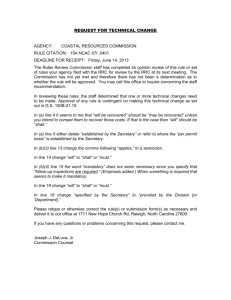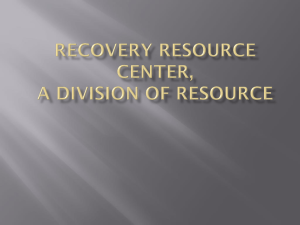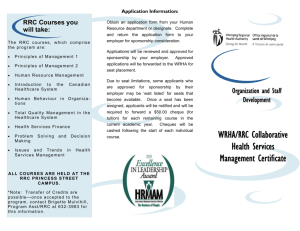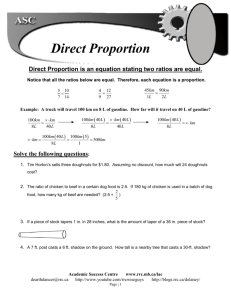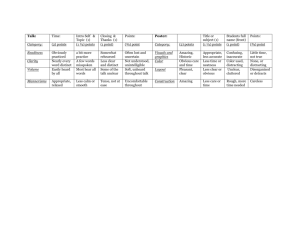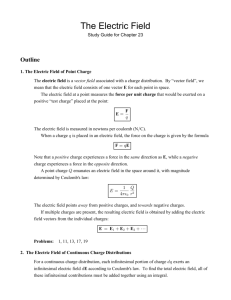Child Care Commission
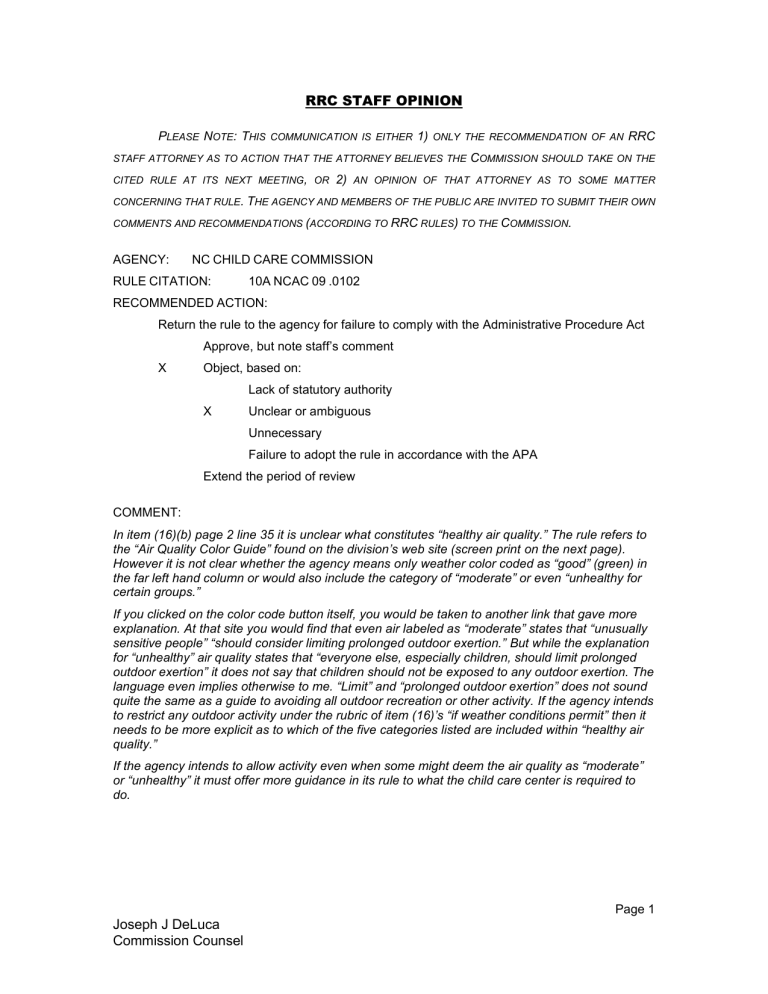
RRC STAFF OPINION
P LEASE N OTE : T HIS COMMUNICATION IS EITHER 1) ONLY THE RECOMMENDATION OF AN RRC
STAFF ATTORNEY AS TO ACTION THAT THE ATTORNEY BELIEVES THE C OMMISSION SHOULD TAKE ON THE
CITED RULE AT ITS NEXT MEETING , OR 2) AN OPINION OF THAT ATTORNEY AS TO SOME MATTER
CONCERNING THAT RULE .
T HE AGENCY AND MEMBERS OF THE PUBLIC ARE INVITED TO SUBMIT THEIR OWN
COMMENTS AND RECOMMENDATIONS ( ACCORDING TO RRC RULES ) TO THE C OMMISSION .
AGENCY: NC CHILD CARE COMMISSION
RULE CITATION: 10A NCAC 09 .0102
RECOMMENDED ACTION:
Return the rule to the agency for failure to comply with the Administrative Procedure Act
X
Approve, but note staff’s comment
Object, based on:
X
Lack of statutory authority
Unclear or ambiguous
Unnecessary
Failure to adopt the rule in accordance with the APA
Extend the period of review
COMMENT:
In item (16)(b) page 2 line 35 it is unclear what constitutes “healthy air quality.” The rule refers to the “Air Quality Color Guide” found on the division’s web site (screen print on the next page).
However it is not clear whether the agency means only weather color coded as “good” (green) in the far left hand column or would also include the category of “moderate” or even “unhealthy for certain groups.”
If you clicked on the color code button itself, you would be taken to another link that gave more explanation. At that site you would find that even air labeled as “moderate” states that “unusually sensitive people” “should consider limiting prolonged outdoor exertion.” But while the explanation for “unhealthy” air quality states that “everyone else, especially children, should limit prolonged outdoor exertion” it does not say that children should not be exposed to any outdoor exertion. The language even implies otherwise to me. “Limit” and “prolonged outdoor exertion” does not sound quite the same as a guide to avoiding all outdoor recreation or other activity. If the agency intends to restrict any outdoor activity under the rubric of item (16)’s “if weather conditions permit” then it needs to be more explicit as to which of the five categories listed are included within “healthy air quality.”
If the agency inten ds to allow activity even when some might deem the air quality as “moderate” or “unhealthy” it must offer more guidance in its rule to what the child care center is required to do.
Page 1
Joseph J DeLuca
Commission Counsel
In item (20) page 2 it is unclear what constitutes the “equivalent” of the N.C. Early Educator
Certification. There are other rules, e.g. rule .2819(b)(1) and (3)(A), that require having this certification “or its equivalent.” Since that equivalency occurs in more than one place it seems as if the standard(s) should be provided here. Note that in item (3) on page 1 at lines 15-16 the agency did define what would establish an equivalency standard for “’Basic School-Age Care’ training ( BSAC training).” It seems they should do the same here.
It is likewise unc lear if there is any definition at all for the “N.C. Early Childhood Administration
Credential” or the standard for “its equivalent” or for “early childhood” as referred to in Rule .2819.
Page 2
Joseph J DeLuca
Commission Counsel
RRC STAFF OPINION
P LEASE N OTE : T HIS COMMUNICATION IS EITHER 1) ONLY THE RECOMMENDATION OF AN RRC
STAFF ATTORNEY AS TO ACTION THAT THE ATTORNEY BELIEVES THE C OMMISSION SHOULD TAKE ON THE
CITED RULE AT ITS NEXT MEETING , OR 2) AN OPINION OF THAT ATTORNEY AS TO SOME MATTER
CONCERNING THAT RULE .
T HE AGENCY AND MEMBERS OF THE PUBLIC ARE INVITED TO SUBMIT THEIR OWN
COMMENTS AND RECOMMENDATIONS ( ACCORDING TO RRC RULES ) TO THE C OMMISSION .
AGENCY: NC CHILD CARE COMMISSION
RULE CITATION: 10A NCAC 09 .2819
RECOMMENDED ACTION:
Return the rule to the agency for failure to comply with the Administrative Procedure Act
X
Approve, but note staff’s comment
Object, based on:
X
Lack of statutory authority
Unclear or ambiguous
COMMENT:
Unnecessary
This rule should be broken into multiple rules and the portions common or applicable to many, if not all, of the seven point levels put into separate rules. The rule is difficult to follow and perhaps unclear in determining the standards that set each “point level” apart. [The rule establishes seven
“point levels” to distinguish the level to which the various child care centers can aspire.] The rule is especially difficult to follow in the last sub-sub-paragraphs and the requirements are unclear because they are formatted as lengthy run-on sentences with confusing semicolons and commas rather than formatted as lists. To cite one example: In (d)(5)(B) page 4 lines 20 – 31 it is not clear what the varying alternatives are for the program coordinator to satisfy, especially the hours of experience that are required to meet each alternative.
I have requested the above as a technical change since it could be done without changing the meaning, or at least what many people including the agency have probably understood as the meaning and requirement of the rule.
If the agency is unwilling to do this I believe the RRC should object to this rule based on ambiguity for the reasons set out above. If the agency is willing to do this and needs additional time I would recommend extending the period of review on this rule.
It is also unclear if the re is any definition at all for the “N.C. Early Childhood Administration
Credential” or the standard for “its equivalent” or for “early childhood” as used throughout this rule. See e.g., (b)(1)(A) for the former and (b)(1)(B) for the latter. Without a definition the meanings for these terms and therefore the qualifications for these various positions are unclear.
It also seems to me that the definition of “administrative” (and its variants) duties found in
(b)(1)(B) and elsewhere in this rule is unclear. Perhaps it is a term of art that presents no difficulties to the applicants for this position, those who hire, and those who enforce the requirements and rate the centers. If so, the agency needs to assert this position.
Page 3
Joseph J DeLuca
Commission Counsel
RRC STAFF OPINION
P LEASE N OTE : T HIS COMMUNICATION IS EITHER 1) ONLY THE RECOMMENDATION OF AN RRC
STAFF ATTORNEY AS TO ACTION THAT THE ATTORNEY BELIEVES THE C OMMISSION SHOULD TAKE ON THE
CITED RULE AT ITS NEXT MEETING , OR 2) AN OPINION OF THAT ATTORNEY AS TO SOME MATTER
CONCERNING THAT RULE .
T HE AGENCY AND MEMBERS OF THE PUBLIC ARE INVITED TO SUBMIT THEIR OWN
COMMENTS AND RECOMMENDATIONS ( ACCORDING TO RRC RULES ) TO THE C OMMISSION .
AGENCY: NC CHILD CARE COMMISSION
RULE CITATION: 10A NCAC 09 .2820
RECOMMENDED ACTION:
Return the rule to the agency for failure to comply with the Administrative Procedure Act
X
Approve, but note staff’s comment
Object, based on:
X
Lack of statutory authority
Unclear or ambiguous
COMMENT:
Unnecessary
The analysis and opinion applied to the previous rule apply to this one as well. Those comments were:
This rule should be broken into multiple rules and the portions applicable to many, if not all, of the point levels put into separate rules. The rule is difficult to follow and perhaps unclear in determini ng the standards that set each “point level” apart. [The rule establishes seven “point levels” to distinguish the level to which the various child care centers can aspire.] The rule is especially difficult to follow in the last sub-sub-paragraphs and the requirements are unclear because they are formatted as lengthy run-on sentences with confusing semicolons and commas rather than formatted as lists. To cite one example: In (e)(2)(A) and (B) page 2 lines 17 – 25 it is not clear what the varying alternatives are for the program coordinator to satisfy, especially the hours of experience that are required to meet each alternative.
I have requested the above as a technical change since it could be done without changing the meaning, or at least what many people including the agency have probably understood as the meaning and requirement of the rule.
If the agency is unwilling to do this I believe the RRC should object to this rule based on ambiguity for the reasons set out above. If the agency is willing to do this and needs additional time I would recommend extending the period of review on this rule.
It is unclear if there is any definition at all for th e “N.C. Early Childhood Administration Credential” or the standard for “its equivalent” as used throughout beginning in (c)(1).
It also seems to me that the definition of “administrative” (and its variants) duties found in (c)(1) line 13 and elsewhere in this rule is unclear. Perhaps it is a term of art that presents no difficulties to both the applicants for this position, those who hire, and those who enforce the requirements and rate the centers. If so, the agency needs to assert this position.
Page 4
Joseph J DeLuca
Commission Counsel
RRC STAFF OPINION
P LEASE N OTE : T HIS COMMUNICATION IS EITHER 1) ONLY THE RECOMMENDATION OF AN RRC
STAFF ATTORNEY AS TO ACTION THAT THE ATTORNEY BELIEVES THE C OMMISSION SHOULD TAKE ON THE
CITED RULE AT ITS NEXT MEETING , OR 2) AN OPINION OF THAT ATTORNEY AS TO SOME MATTER
CONCERNING THAT RULE .
T HE AGENCY AND MEMBERS OF THE PUBLIC ARE INVITED TO SUBMIT THEIR OWN
COMMENTS AND RECOMMENDATIONS ( ACCORDING TO RRC RULES ) TO THE C OMMISSION .
AGENCY: NC CHILD CARE COMMISSION
RULE CITATION: 10A NCAC 09 .2822
RECOMMENDED ACTION:
Return the rule to the agency for failure to comply with the Administrative Procedure Act
Approve, but note staff’s comment
X Object, based on:
X
Lack of statutory authority
Unclear or ambiguous
Unnecessary
Failure to adopt the rule in accordance with the APA
Extend the period of review
COMMENT:
I have not recommended an objection to this rule as I did the other two rules based on ambiguity in that the rule is too difficult to follow because of its length and the lack of lists further breaking down and making clear the requirements in the sub-sub- paragraphs. This rule can be rewritten or rearranged comparatively easily and probably just as a technical change.
However if they do make the changes I requested concerning the other rules, or you object to them for the reasons stated, then the agency may wish to rewrite this rule as well depending on the approach they take concerning the contents of those rules possibly affecting the content of this rule.
At the same time there is a problem with the rule.
I read the requirement in (b)(3) of “eight additional clock hours of annual … training” as eight hours total over the five years of experience that is also required in this sub-paragraph. I have asked the agency to verify that the requirement. If the agency responds that the requirement is something other than the way I am reading it – or if any of you read it in a different manner – then the rule is ambiguous and you should object to it.
Page 5
Joseph J DeLuca
Commission Counsel
I also believe the requirement in (e)(1) is unclear. I will rewrite the rule in a list requirement as I understand it (using abbreviations not found in the rule):
(e) … operator shall have completed:
(1) Either:
(A) The NCFCC or its equivalent; or
(B) Level 1 certification on the ECE scale; and
Now, here is where I begin to get confused. I believe the rule is intended to be read, based on my initial reading of it:
(e)… operator shall have completed:
(1) Either:
(A) The NCFCC or its equivalent; or
(B) Level 1 certification on the ECE scale; and
(2) Twelve semester credit hours in … development (not including … coursework); and either
(A) Two of the twelve hours must be in ECE or in child care administration; or
(B) One year verifiable early childhood work experience.
However I believe that it is a possible reading of the rule as follows: e)… shall have completed:
(1) Either:
(A) The NCFCC or its equivalent; or
(B) Level 1 certification on the ECE scale; and
(2) Either:
(A) Have completed 12 semester credit hours in … development (not including … coursework) and two of the twelve hours must be in
ECE or in child care administration; or
(B) Have one year verifiable early childhood work experience.
The same difficulty and ambiguity in reading applies to (f)(1).
Page 6
Joseph J DeLuca
Commission Counsel
